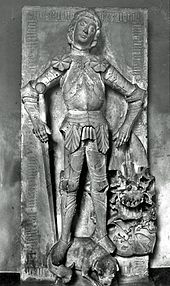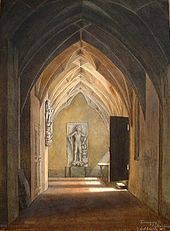Nickel Pflugk (Knauthain)
Nickel Pflugk (* 1410, † 27. March 1482 in Leipzig ), to distinguish between identical occurrences also "to Knauthain called" or "the Iron", was one of the Meissen Uradelsgeschlecht the Pflugks originating adviser to several Saxon dukes and electors and bailiff and manor owners .
Life
Tham Pflugk (around 1385–1426) and his wife Anna, née von Bünau , were the parents of Nickel Pflugk. Thams ancestor who made Bohemia originating Knight Otto Pflugk was, with 1,338 Strehla on the Elbe and 1349 with Gohlis , Mockau , Großzschocher , Volkmarsdorf been invested to Leipzig and Knauthain. When Nickel's father was killed in the battle of Aussig in 1426 , he and his brothers Hans and Tham took over the management of the goods, with Nickel in particular going to Knauthain, hence the name affix.
Nickel Pflugk was a member of the estates that proposed the division of the country ( Altenburg division ) in 1445 after the differences between the Wettin brothers, Elector Friedrich the Meek and Duke Wilhelm the Brave, could no longer be bridged. In the following Saxon fratricidal war , Pflugk fought on the side of Friedrich and, together with Kunz von Kaufungen , was captured by Wilhelmine Germany, from which he was released with the help of relatives for a large ransom. Because of his bravery in numerous battles, he was nicknamed "the Iron".
He used his considerable fortune to acquire various country estates near Leipzig, Pegau and Groitzsch as well as the purchase of a free house in the Leipziger Burgstrasse, which later belonged to the complex of the Thuringian court . He also became an important lender to the Electors and Emperor Friedrich III and was involved in the country's political endeavors. The Eger Treaty of 1459 on the border between Saxony and Bohemia on the Ore Mountains ridge bears its seal among others .
After the death of Elector Friedrich, Pflugk became a close confidante of Elector Ernst . He traveled with him to various negotiations, including the 1471 Reichstag in Regensburg . As bailiff of Leipzig, Borna and Pegau as well as secret council of the elector he reached the high point of his career. He thus had a significant influence on the shaping of Wettin domestic and foreign policy in the 15th century.
Nickel Pflugk married Elisabeth, née von Schleinitz, around 1450 . The couple had four sons, Hans († 1484), Caesar (1455–1524,), Tham († 1503), Haubold († 1506) and Andreas (1480–1542) and their daughter Anna. Caesar was state and appellate councilor, envoy, governor and manor owner, Tham was bailiff of Quedlinburg and Andreas was councilor, bailiff of Dornburg and Leipzig and manor owner.
Nickel Pflugk died in 1482 and was buried in the Pflugk chapel on the north side of the St. Pauli monastery church in Leipzig. His tombstone, which shows him as a young man, was moved to the cloister of what is now the university church after the Pflugk chapel was demolished in 1844. After the university church was blown up in 1968, it is now in the Leipzig Thomaskirche .
literature
Martina Schattkowsky (Hrsg.): The von Bünau family: aristocratic rule in Saxony and Bohemia from the Middle Ages to modern times . Leipziger Univ.-Verlag 2008, ISBN 978-3-86583-235-1
Web links
Jens Kunze: Nickel Pflugk . In: Institute for Saxon History and Folklore (Ed.): Saxon Biography .
Individual evidence
- ^ Peter Schwarz: The millennial Leipzig . Volume 1. ProLeipzig 2015, ISBN 978-3-945027-04-2 , p. 61
| personal data | |
|---|---|
| SURNAME | Pflugk, nickel |
| ALTERNATIVE NAMES | Plow, nickel; Pflugk zu Knauthain, nickel; Nickel Pflugk, the iron man |
| BRIEF DESCRIPTION | Councilor, bailiff and manor owner |
| DATE OF BIRTH | 1410 |
| DATE OF DEATH | March 27, 1482 |
| Place of death | Leipzig |

